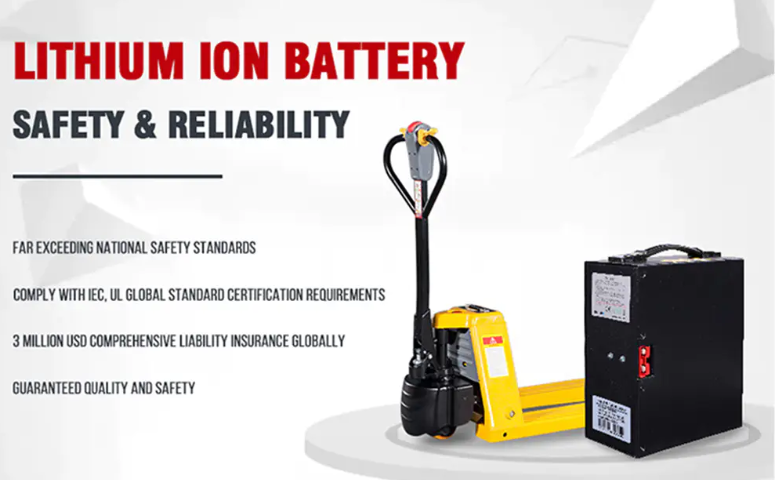In the fast-paced environment of warehousing, retail, and delivery operations, efficiency, reliability, and cost-effectiveness are key. Among the myriad tools and technologies employed in these sectors, lithium battery pallet trucks have emerged as a game-changing solution, demonstrating multiple advantages over traditional methods.
Introduction To Lithium Pallet Trucks
Before delving into the benefits, it's crucial to understand what lithium battery pallet trucks are and how they operate. These are motorized pallet truck or jack powered by lithium-ion batteries, a significant departure from conventional lead-acid batteries. These pallet trucks are used for lifting and moving pallets within warehouses, retail spaces, and during delivery operations.

Advantages Of Lithium Pallet Trucks
The Advantages of li ion pallet trucks are as follows:
Energy Efficiency and Longevity
The energy density of lithium-ion batteries is significantly higher than traditional lead-acid batteries. This allows for longer operating hours before a recharge is required, thus leading to increased productivity. Additionally, these batteries have a longer lifespan, reducing the need for frequent replacements, which can lower operational costs over time.
Faster Charging and Opportunity Charging
One of the significant advantages of lithium-ion technology is its rapid charging capability. Unlike traditional batteries that may require 8-12 hours to recharge fully, lithium-ion batteries can reach full capacity in a much shorter time.
Furthermore, these batteries support opportunity charging - short charging bursts during breaks without damaging the battery’s lifespan, contributing to continuous operations and maximizing uptime.
Reduction in Maintenance
Lithium-ion batteries require much less maintenance compared to their lead-acid counterparts. They do not need water maintenance, eliminating the associated labor costs and potential for errors, while reducing the risks of battery acid spills that could lead to damage or injuries.
Environmental Sustainability
Lithium-ion batteries have a more favorable environmental footprint compared to lead-acid batteries. They are more energy-efficient, reducing greenhouse gas emissions. Additionally, they have a longer lifespan, reducing waste from battery replacements.
Impact on Warehousing, Retail, and Delivery Operations
Enhanced Productivity
Lithium battery pallet trucks, with their longer operating hours and fast-charging capabilities, enhance productivity. They reduce downtime associated with battery charging and swapping, ensuring that pallet trucks can be operational when needed.
Cost Savings
While the upfront costs of lithium-ion pallet trucks may be higher, the total cost of ownership is often lower. Savings come from reduced battery replacements, lower energy costs, and decreased maintenance labor.
Improved Safety
Reducing the need for manual handling of heavy lead-acid batteries can decrease workplace accidents, making the use of li ion pallet trucks a safer option. Also, eliminating the need for battery watering reduces the risk of acid spills.
Flexibility in Operations
The fast charging and opportunity charging capabilities of lithium-ion batteries offer flexibility, especially valuable in fluctuating demand scenarios such as seasonal retail operations or varying delivery schedules.

Employee Health and Performance
Manual pallet trucks place a considerable physical burden on operators, often leading to workplace injuries and health issues like musculoskeletal disorders. Li ion pallet trucks, by being motorized, reduce physical strain, promoting a healthier and more ergonomic work environment.
This can lead to fewer sick days, lower worker turnover, and improved performance and job satisfaction among staff.
Role in Digitalization and Automation
As businesses strive to digitalize their operations and leverage automation technologies, lithium battery pallet trucks fit well within this shift. These machines can come with advanced features like automatic braking, speed control, and even semi-automated and automated functionalities.
Moreover, lithium-ion batteries can be integrated with Battery Management Systems (BMS), which can monitor and report various battery parameters, such as charge level, temperature, and overall health. This can provide actionable insights for maintenance and can be a step towards predictive maintenance strategies, further reducing operational downtime and costs.
Current Market Trends
The market for lithium-ion batteries in industrial applications has been growing rapidly. The global lithium-ion battery market size was valued at USD 36.7 billion in 2019 and is expected to grow at a compound annual growth rate (CAGR) of 13.0% from 2020 to 2027 (as per a report from Grand View Research).
The increase in demand for electric vehicles and energy storage systems, coupled with a decline in lithium-ion battery costs, is driving this growth. Similarly, the trend is noticeable in the material handling sector, with more businesses transitioning to lithium-ion-powered equipment, such as li ion pallet truck.
Conclusion
Lithium pallet trucks represent a progressive shift in warehousing, retail, and delivery operations, offering significant benefits in terms of productivity, cost-efficiency, safety, and environmental sustainability.
As businesses continue to seek out ways to optimize their operations, the adoption of lithium battery pallet trucks will undoubtedly become more widespread, making them a key player in these sectors. The way forward is clear: Leveraging li ion pallet trucks is not just a viable option, it's imperative for businesses to stay competitive in the current industrial landscape.
 +86-574-89217230 |
+86-574-89217230 |  info@cnmhe.com
info@cnmhe.com
















